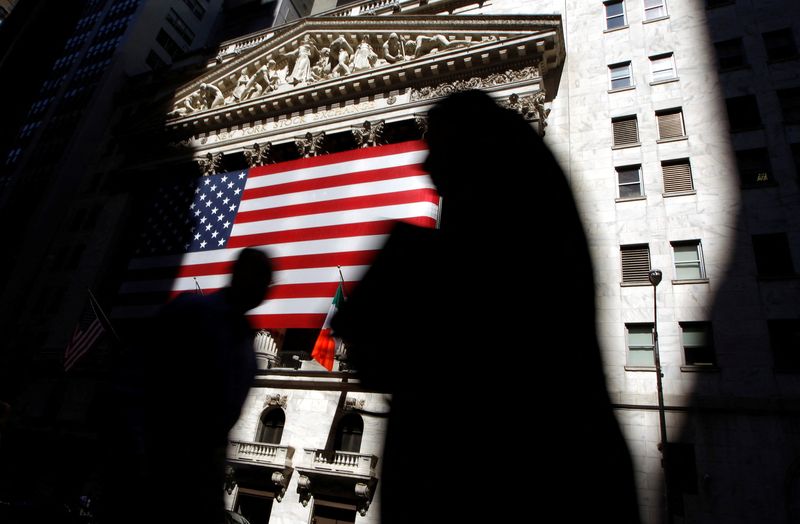Investing.com -- Futures faltered on Monday, paring back some earlier gains, after last-minute negotiations between lawmakers on Capitol Hill over the weekend led to a surprise short-term funding deal that averted a U.S. government shutdown. Elsewhere, UAW workers and Mack Trucks forge an agreement to avoid a strike, while the World Bank cuts its growth forecast for China's economy next year.
1. Futures waver after government shutdown avoided
U.S. stock futures hovered around the flatline on Monday as investors poured over an eleventh-hour deal to prevent a U.S. government shutdown over the weekend and looked ahead to fresh economic data this week.
At 06:47 ET (10:47 GMT), the Dow futures contract had dipped 20 points or 0.1%, S&P 500 futures were mostly unchanged, and Nasdaq 100 futures rose by 26 points or 0.2%.
The main indices were mixed in the final day of September trading on Friday, although all three slipped on a monthly basis. The S&P 500 and Nasdaq Composite in particular dropped to their worst month of 2023 so far.
However, the indices are up for the year, highlighting the strength of a rally several months ago that was driven by soaring enthusiasm for generative artificial intelligence.
Traders will be keeping an eye on new economic numbers on both manufacturing activity and construction spending due out on Monday, as markets continue to track the development of the U.S. economy and gauge the potential path ahead for Federal Reserve monetary policy.
2. Biden pledges Ukraine backing after shutdown averted
U.S. President Joe Biden has vowed not to "walk away" from Ukraine after a plan to provide $6 billion in fresh aid to the country was scuppered by lawmakers to avert a government shutdown.
The broadly unexpected agreement forged on Capitol Hill over the weekend will keep the government open until November 17, but does not include additional money for Ukraine on top of the $113B that has already been approved since the outbreak of hostilities with Russia.
Yet speaking on Sunday, Biden said that a "vast majority" of members of both his Democratic party and their Republican counterparts are still in favor of sending financial backing to the country. Biden previously requested an extra $24B in August, with the White House hoping to both maintain Ukraine's battlefield capabilities and provide humanitarian assistance.
Republicans have said that any further funding would need to be tied to U.S. border security reforms, which House Speaker Kevin McCarthy -- himself the target of disgruntled hardline party members -- called his "priority."
3. UAW workers reaches labor deal with Mack Trucks
A group of about 4,000 workers represented by the United Auto Workers union have hashed out a temporary deal with Volvo (OTC:VLVLY) Group-owned Mack Trucks that avoids a potential strike.
The tentative agreement, which was made shortly before midnight Eastern Standard Time on Sunday and was announced on social media, must still be ratified by the UAW.
Almost all of the Mack Truck's staff, who are asking for improved wages and benefits, had signed off on a strike last month, the UAW said. A prior deal, which was first signed after a two-week walkout in 2019, was set to expire on Sunday night.
Many UAW members have already been staging weeks of strikes at factories run by major car manufacturers General Motors (NYSE:GM), Ford Motor (NYSE:F), and Jeep-parent Stellantis (NYSE:STLA).
In a statement, Mack President Stephen Roy lauded the temporary agreement, saying it will deliver better pay and benefits to the company's employees and families.
4. World Bank slashes China growth forecast
The World Bank has lowered its outlook for growth next year in China, citing a series of soft data points from the world's second-largest economy.
In a semi-annual report released on Sunday, the bank flagged the impact of an ongoing property sector liquidity crisis and a sputtering post-pandemic recovery, as well as external factors like trade protectionism and elevated interest rates.
As a result, it now expects China's economic output to increase by 4.4% in 2024, down from its previous estimate of 4.8% in April. Expectations for growth this year of 5.1% were, however, left unchanged.
Green shoots may be starting to appear in the Chinese economy following months of weak economic indicators. On Saturday, an official survey showed that the country's factory activity expanded for the first time in six months. Manufacturing output and retail sales growth also accelerated in August, while a fall in exports and imports eased.
Beijing has recently moved to shore up the economy, though some analysts have argued that more support will be necessary for the government to hit its 5% growth objective for this year.
5. Oil stabilizes amid supply tightness
Oil prices rose on Monday, supported by concerns over a tight supply picture and relief that the U.S. government avoided a potentially damaging shutdown.
By 06:48 ET, the U.S. crude futures traded 1.1% higher at $91.78 a barrel, while the Brent contract climbed 1.1% to $93.25. Bolstered by a decision by Saudi Arabia and Russia to extend output reductions until the end of the year, crude prices jumped by almost 30% in the third quarter.
The Organization of the Petroleum Exporting Countries and its allies -- a group that includes both Riyadh and Moscow -- will likely not change its production policy at a closely-watched meeting of the Joint Ministerial Monitoring Committee on Wednesday, Reuters has reported.
Separately, OPEC Secretary-General Haitham Al Ghais noted on Monday that oil demand is expected to remain "resilient" over the rest of 2023, a prediction that was boosted by the latest factory activity figures out of top oil importer China.
